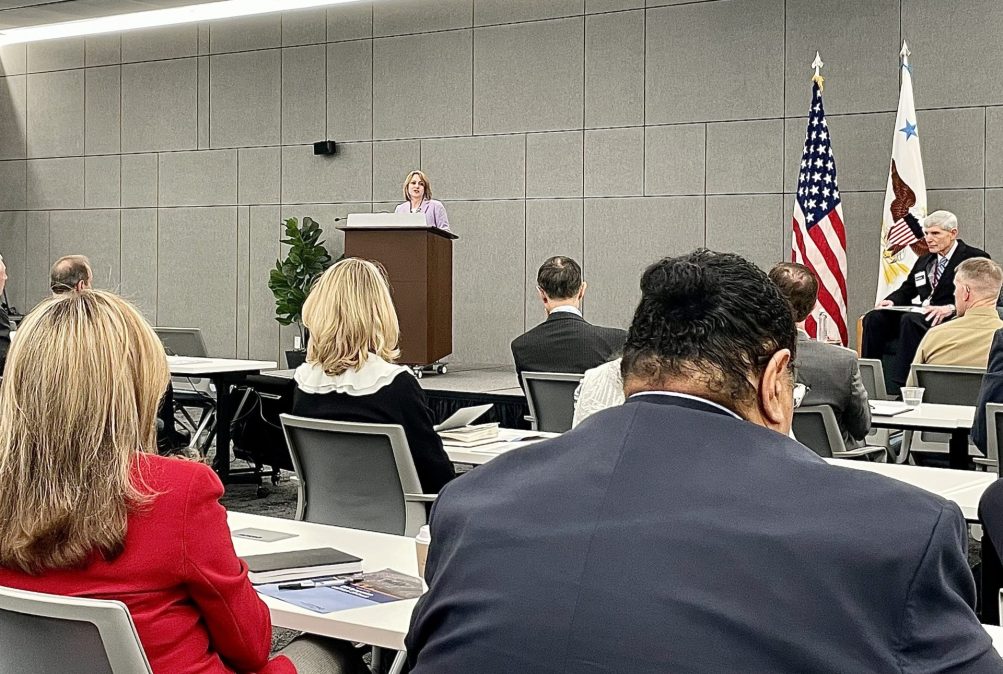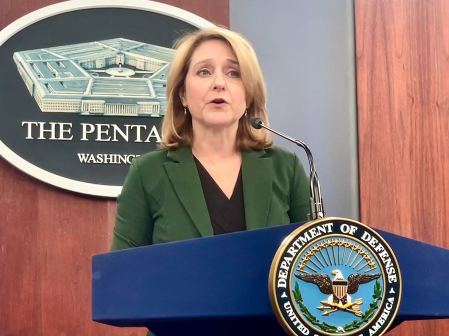DOD unveils broad plan and new institute to transform its enterprise management

With sights ultimately set on driving drastic operational and performance improvements across its colossal enterprise, the Pentagon set up its first-ever Defense Management Institute (DMI).
This new non-partisan research and engagement organization, publicly unveiled on Tuesday, is administered by the Institute for Defense Analyses, a nonprofit based in Alexandria, Virginia. Defense Department leaders who formed DMI aim for it to enable a fresh network of diverse experts, better tools and more informed research to solve the agency’s complex, interdisciplinary and evolving management-related struggles.
“Optimizing how we manage this gigantic enterprise is essential not only for safeguarding taxpayer dollars — our business systems are tied to our warfighting efforts. Meeting our management goals ensures the department achieves its military goals. So, that is why we cannot ignore or easily escape our immense management challenges,” Deputy Defense Secretary Kathleen Hicks told attendees at DMI’s kickoff event in Virginia on Tuesday.
“It is incumbent on us — with the life or death mission our servicemembers commit to and entrust us to oversee — to reform ourselves to help them,” she said.
The ‘fourth’ reform
The DOD is one of the biggest and most intricate enterprises in the world.
In addition to military units that operate nonstop around the globe, the department also has medical systems, school systems and universities, grocery chains, intelligence agencies, information systems, and more — all supported by multiple workforces and personnel systems.
To former Air Force Secretary Michael Donley, the person tasked to help Hicks drive the department’s overarching modern management reform, the uniqueness of the DOD’s missions, size and diversity is “quite breathtaking.”
During the DMI symposium event on Tuesday, Donley — who serves in dual roles as DOD’s director of administration and management and its performance improvement officer — said using the World Bank’s latest GDP data, the department’s annual budget would rank among the top 20 largest economies in the world.
“So as a thought experiment, ask yourself, ‘How would I manage an economy the size of the Netherlands — but instead of a free market economy, it is a command economy with all of its resources carefully, centrally balanced and distributed among competing missions, functions and activities, and then approved annually through an open democratic process?’” Donley said.
In his view, the department’s “long history of management, technological and organizational change has been evolutionary — and at the same time, punctuated by senior leader or congressional interventions, and the exigencies of world events.”
Part of the motivation for DMI’s establishment was the belief that officials across DOD “should know that history better than we often do,” he said. And overall, the Pentagon should be capturing and sharing lessons learned in better ways to inform lawmakers and federal leadership about successes and failures in this regard.
The rationale for the new institute also includes guidance from Congress that mandates the defense secretary to carry out a set of activities to improve management effectiveness and incorporate private sector-led practices and technologies to enhance the department’s associated workforce, Donley confirmed.
The fiscal 2023 National Defense Authorization Act also directs the DOD to conduct reform-focused research to improve management and administrative science across its organization.
In a memo dated Jan. 13, Donley announced the official creation of DMI and laid out the Pentagon’s wide vision and its initial top three priorities. Those include: developing a defense management network of expertise and a community of practice with experts and practitioners from various disciplines and sectors who can be readily available to help the department confront crucial management issues; steering cutting-edge research on management topics to boost the informing of leadership; and building a digital repository of research and other resource materials on defense management.
Building on years of debate and a rocky history, Congress in 2020 dissolved the Pentagon’s chief management officer (CMO) role. This new institute in some ways represents how DOD is paving out a new approach for the future.
Donley said DMI is tasked with “looking back” and “looking forward.”
Looking back, he said, the institute will review why the department’s CMO experience was historically “less than successful.” And then, “looking forward” Donley said DMI has been directed to assist the department in meeting the requirements of Title 10, Section 192 of the U.S. code, which requires periodic cyclical reviews of defense agencies and field activities.
“The precise details of this effort are still under discussion and will be reviewed over the weeks ahead,” he confirmed.
At the event, Hicks also reflected on how the Pentagon is facing management challenges that are “multi-faceted and generational,” noting that “this has been a top priority for Secretary Lloyd Austin and for me.”
Hicks spotlighted her team’s major focus areas and accomplishments so far regarding accelerating performance improvements within DOD.
She said officials have worked to establish clear governance groups and ensure that decision-making processes are fair and effective.
“Second, we’ve also made changes to our organizational structures to implement and monitor reforms,” Hicks noted, pointing to the elevation of Donley’s roles prior to the stand-up of this new institute.
“Third, we have taken substantial steps to transform the department into a data-driven organization,” she said, highlighting her establishment of the Chief Digital and Artificial Intelligence Office (CDAO), as well as the materials and capabilities it has recently been refining and deploying.
Now that her teams are setting up new technologies and have provided performance goals and measures, Hicks noted that their next step is to implement all those tools across DOD.
“The fourth major defense reform effort … is launching this Defense Management Institute. DMI is yet another major step forward in transforming the department to meet today’s national security challenges,” she said.
Details remain to be addressed
According to Hicks, DMI is “groundbreaking — because never before has there been an institute dedicated solely to performance improvement.”
However, because it is so new at this point, a lot remains unclear about how the new institute will function and the outputs it’s meant to generate.
“There are some important details that remain to be addressed, such as how we will work across our DOD team internally to develop and coordinate priorities for a DMI research agenda,” Donley noted on Tuesday at the DMI symposium.
During a call with reporters on Monday to preview this news, a senior Defense official also left room for clarity on several matters associated with DMI.
For instance, in Donley’s memo announcing the new group, he wrote that DMI’s core work will be funded by his office through IDA’s contract with the Pentagon — and that its network will also conduct funded research on behalf of other agency components.
“I’m really not talking [about budget] resources here,” the official said in response to questions from reporters on DMI funding.
Donley’s memo from mid-January also notes that the planned digital repository of research, and other assets “will be publicly available in the next few weeks.” On the call, the senior Defense official said “that’s a work-in-progress,” but that they did not have a specific date set for the new tool’s launch.
The official was also vague in answering DefenseScoop’s questions about the technical infrastructure that will underpin the envisioned repository. And when asked whether the system will host sensitive or classified information, the senior Defense official said: “I don’t think I can speak to that right now.”






